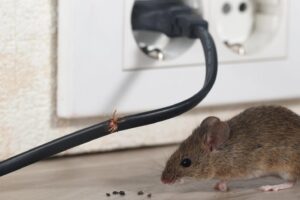Imagine returning to your property to find evidence of mice damaging electric wiring and creating fire hazards. It can seem like just a nightmare, but is a real risk. Mice are notorious for chewing electrical wiring, which can lead to short circuits, power outages, and fires. In fact, an estimated 10-16% of structural fires in Canada from 2014 to 2021 were caused by electrical problems that could be from rodent damage. In Alberta, fires caused by mice are often considered “cause unknown”. Mice can contaminate goods, damage equipment, cause anxiety and distress, and spread diseases such as hantavirus, salmonella, and leptospirosis.
All rodents, from mice and rats to squirrels, gophers, and voles have continuously growing teeth and need to gnaw on things to keep their teeth to a manageable, healthy length. Mice can chew on and through wood, plastic, fabric, insulation, and electrical wiring. Fortunately, expensive repairs and dangerous consequences from mice can be prevented by acting early.
Here are some simple steps that you can use to keep your home or business safe from mice and the costly risks they bring.
Preventative Measures: 5 Effective Ways to Prevent Mice From Invading Your Property
The following five actions help prevent mice and other pests (including ants and birds) from entering your home, business, and other buildings.
1. Seal holes and install barriers: Every year, inspect the outside of your building for cracks, gaps, and holes, and seal them with appropriate materials to keep mice out. Install door sweeps and screens on windows and doors to block entry points. Use non-rusting metal mesh to cover larger openings.
2. Remove and reduce outdoor hiding places: Search outdoor areas around your property for places where mice can hide before going into nearby buildings. Reduce hiding spots by removing debris, keeping grass and weeds short, filling in holes around rocks and concrete, cutting back brush, and storing firewood up and away from buildings. Secure garbage and compost in rodent-proof bins.
3. Control food sources: Outdoors – avoid feeding wildlife, having birdfeeders, and leaving out pet dishes. Indoors – store all human and animal food in tough, airtight containers. Avoid leaving pet food out. Secure garbage in rodent-proof bins. Clean up food spills and crumbs.
4. Look for signs: Regularly check for signs of mice such as droppings, nests, odours, listen for sounds of chewing and running, gnaw marks and holes chewed into food, fabric, and other items. Mouse activity is more likely to be in areas with food such as kitchens and quieter places such as storage areas.
5. Act Immediately: If you notice signs of an infestation, act quickly to address the problem with mouse control products or professional pest control services.
More Ways to Protect Your Property from Potential Fire Hazards and Costly Repairs
There are a few more tactics you can use to protect your residential or commercial property and electrical wiring from the dangers of gnawing mice. If you notice any damage to wiring, you may need a licensed and certified electrician as well as a pest control professional.
1. Cover Wires: Use protective coverings such as conduits for electrical wiring to prevent rodents from chewing on wires.
2. Inspect Wiring: Regularly inspect your electrical wiring and outlets for signs of gnawing or damage. Early detection can help prevent more serious issues such as electrical failures or fires.
3. Tighten Connections: Ensure that all electrical connections are secure and that outlets are properly installed. Loose connections can create heat, making them both a fire hazard and more attractive to rodents seeking warmth.
Are Mice Still Foolin’ With Your Property?
If mice have gotten into your home or commercial property in Western Canada, call Poulin’s Pest Control. We’ve been eradicating rodent problems across the prairies since 1946.

